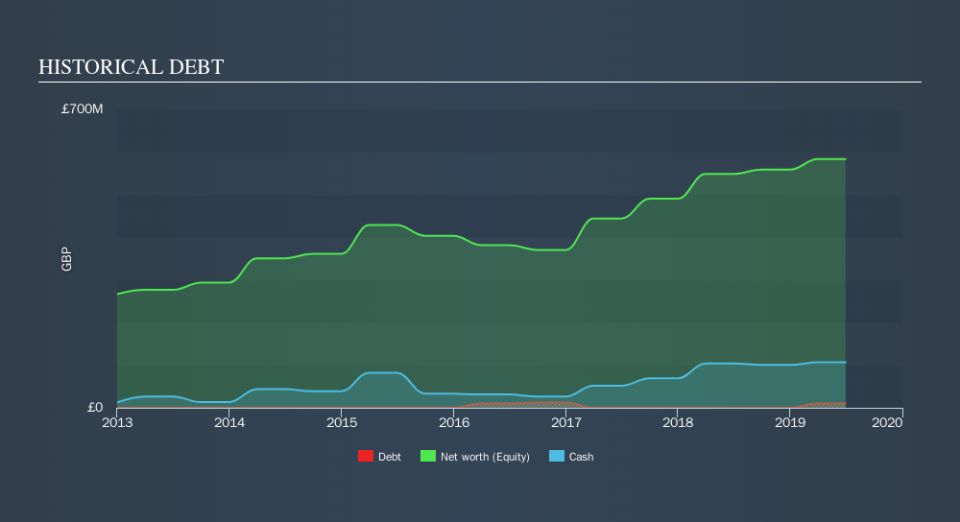Renishaw (LON:RSW) Has A Pretty Healthy Balance Sheet

Howard Marks put it nicely when he said that, rather than worrying about share price volatility, 'The possibility of permanent loss is the risk I worry about... and every practical investor I know worries about. So it might be obvious that you need to consider debt, when you think about how risky any given stock is, because too much debt can sink a company. As with many other companies Renishaw plc (LON:RSW) makes use of debt. But the more important question is: how much risk is that debt creating?
What Risk Does Debt Bring?
Debt is a tool to help businesses grow, but if a business is incapable of paying off its lenders, then it exists at their mercy. Ultimately, if the company can't fulfill its legal obligations to repay debt, shareholders could walk away with nothing. However, a more frequent (but still costly) occurrence is where a company must issue shares at bargain-basement prices, permanently diluting shareholders, just to shore up its balance sheet. Of course, the upside of debt is that it often represents cheap capital, especially when it replaces dilution in a company with the ability to reinvest at high rates of return. When we think about a company's use of debt, we first look at cash and debt together.
See our latest analysis for Renishaw
What Is Renishaw's Debt?
As you can see below, at the end of June 2019, Renishaw had UK£10.4m of debt, up from none a year ago. Click the image for more detail. However, its balance sheet shows it holds UK£106.8m in cash, so it actually has UK£96.4m net cash.
How Healthy Is Renishaw's Balance Sheet?
We can see from the most recent balance sheet that Renishaw had liabilities of UK£95.6m falling due within a year, and liabilities of UK£97.0m due beyond that. Offsetting this, it had UK£106.8m in cash and UK£159.2m in receivables that were due within 12 months. So it actually has UK£73.4m more liquid assets than total liabilities.
This surplus suggests that Renishaw has a conservative balance sheet, and could probably eliminate its debt without much difficulty. Simply put, the fact that Renishaw has more cash than debt is arguably a good indication that it can manage its debt safely.
It is just as well that Renishaw's load is not too heavy, because its EBIT was down 34% over the last year. When a company sees its earnings tank, it can sometimes find its relationships with its lenders turn sour. There's no doubt that we learn most about debt from the balance sheet. But ultimately the future profitability of the business will decide if Renishaw can strengthen its balance sheet over time. So if you want to see what the professionals think, you might find this free report on analyst profit forecasts to be interesting.
But our final consideration is also important, because a company cannot pay debt with paper profits; it needs cold hard cash. Renishaw may have net cash on the balance sheet, but it is still interesting to look at how well the business converts its earnings before interest and tax (EBIT) to free cash flow, because that will influence both its need for, and its capacity to manage debt. In the last three years, Renishaw's free cash flow amounted to 46% of its EBIT, less than we'd expect. That's not great, when it comes to paying down debt.
Summing up
While it is always sensible to investigate a company's debt, in this case Renishaw has UK£96.4m in net cash and a decent-looking balance sheet. So we are not troubled with Renishaw's debt use. Above most other metrics, we think its important to track how fast earnings per share is growing, if at all. If you've also come to that realization, you're in luck, because today you can view this interactive graph of Renishaw's earnings per share history for free.
At the end of the day, it's often better to focus on companies that are free from net debt. You can access our special list of such companies (all with a track record of profit growth). It's free.
We aim to bring you long-term focused research analysis driven by fundamental data. Note that our analysis may not factor in the latest price-sensitive company announcements or qualitative material.
If you spot an error that warrants correction, please contact the editor at editorial-team@simplywallst.com. This article by Simply Wall St is general in nature. It does not constitute a recommendation to buy or sell any stock, and does not take account of your objectives, or your financial situation. Simply Wall St has no position in the stocks mentioned. Thank you for reading.

 Yahoo Finance
Yahoo Finance 
